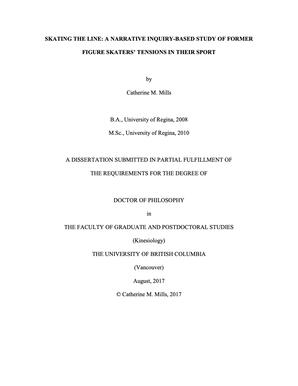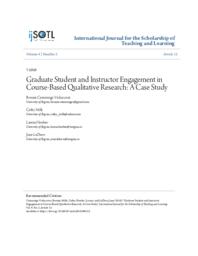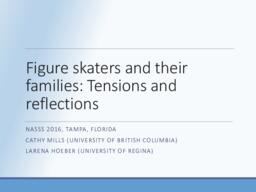Hoeber, Larena
Person Preferred Name
Larena Hoeber
Related Works
Content type
Digital Document
Abstract
Figure skaters skate a fine line as they navigate pressures to execute physically demanding, technical skills while maintaining the aesthetics of movements, appearance, and musicality. These conditions along with embedded narratives of success and performance affect the experiences of every competitive figure skater. As a former figure skater and coach, in this research, I explore the experiences of figure skaters and the inherent tensions they endure (Clandinin, Murphy, Huber, & Orr, 2009). Integrating theories and methods from organizational culture and narrative inquiry, my research explores the experiences of athletes within the culture of high-performance figure skating. I recruited seven former figure skaters (four female and three male) who had competed at a Senior Competitive level in Canada. The research followed three guiding questions: • What tensions do former figure skaters identify in relation to their experience as high-performance figure skaters? • How are these tensions related to the organizational culture of figure skating? • How do participants reflect on these tensions over time? Using artifacts to elicit conversations and reflections, I completed three to four interviews with each participant. I present their stories in a variety of narrative formats to better capture the feel of the interviews and their lived experiences. The figure skaters experienced multiple tensions across their careers as they embraced the lifestyle of a skater and during transitions away from the sport. Tensions included monitoring bodies, an overriding emphasis on competitions and winning, and the importance of music, choreography, and appearance in their overall performance as elite figure skaters. While many tensions were taken-for-granted as being a high-performance athlete, once removed from the sport, participants became aware of the sacrifices they had made and how some aspects of the culture had influenced their mental health and well-being. A critical analysis of the normalized aspects of the sport revealed an emphasis on performance deeply embedded across all levels of figure skating’s organizational culture (Schein, 2010). The dissertation highlights how participants became part of the problematic culture, accepting its localized terms and conditions which in turn served to reinforce and re-create the culture’s dominant values and norms (Alvesson, 2013; Smircich, 1983).
Origin Information
Content type
Digital Document
Abstract
There are a number of logistical considerations that need to be addressed when using photo-elicitation in research, yet these are rarely discussed in the existing literature. This paper elucidates the challenges particular to using photo-elicitation in research and proposes strategies for addressing these issues. We drew upon our experiences using a combination of photographs taken by participants and photographs taken by the researcher in photo-elicitation interviews to examine the perceptions of skaters towards various artefacts in a figure skating club. We present the logistical considerations and strategies around the typical steps of the research process: (1) ethics, (2) participant recruitment, (3) data collection, (4) data management, (5) data analysis and (6) dissemination. Despite the numerous challenges and considerations that accompany the use of photographs in research, we found there to be a number of significant benefits when combining participant-driven and research-driven techniques.
Origin Information
Content type
Digital Document
Abstract
This case study explores the lived experiences of two graduate students and two university instructors in a course-based qualitative research project. The course design was a research methods course that focused on qualitative research and analysis and provided a vehicle for the instructors to reflect on their experiences and the students' experience of the cognitive and affective demands implicit in the assigned tasks. Findings indicate that development of student research skills is enhanced through student engagement in a real-world research project. This authentic learning experience, although stressful and overwhelming within the timelines of the course schedule, was instrumental in assisting the students to believe they could move forward with greater independence as researchers.
Origin Information
Content type
Digital Document
Abstract
Although some elements of community sport organizations (CSOs) are welcoming and shared across all mem- bers, others may be contested. Organizational culture provides a conceptual lens through which to understand the meaning and experiences associated with CSOs. As the outer layer of organizational culture (Schein, 1985), artifacts can give further insight into participant experiences. The purpose of this study is to examine members’ perceptions of artifacts in a local figure skating club. We used Martin’s (1992, 2002) three perspectives to illuminate integrated, differentiated, and fragmented perspectives of The Club’s organizational culture. Eight skaters and seven adults from a midsize figure skating club in Canada participated in photo-elicited interviews. We found integration in participants’ discussion of the unique figure skating facility, differentiated perspectives of achievement-oriented artifacts, and fragmented perspectives of the skaters’ dressing rooms. Our research demonstrates the importance of examining the meanings associated with artifacts in sport organizations.
Origin Information
Content type
Digital Document
Abstract
Although there has been a rise in calls for participatory forms of research, there is little literature on the challenges of involving research participants in all phases of the research process. Actively involving research participants requires new strategies, new researcher and research-participant roles, and consideration of a number of ethical dilemmas. We analyzed the strategies employed and challenges encountered based on our experiences conducting feminist participatory action research with a marginalized population and a variety of community partners over 3 years. Five phases of the research process were considered including developing the research questions, building trust, collecting data, analyzing data, and communicating the results for action. Our goals were to demonstrate the relevance of a participatory approach to sport management research, while at the same time acknowledging some of the realities of engaging in this type of research.
Origin Information
Content type
Digital Document
Abstract
Conference presentation delivered at the <a href="https://nasss.org/">North American Society for the Sociology of Sport (NASSS)</a>, Tampa, Florida, 2016.
<p>The presentation examined the complexity of figure skaters’ familial relationships both at home and at the skating rink. Narrative inquiry gave us insight into athletes’ family-related stories increasing our understanding of their subjective and complex worlds (Smith, 2010). We explored seven former figure skaters’ reflections at both personal and social levels (sociality), over time (temporality), and as their participation in high performance sport changed (place; Connelly & Clandinin, 2000). While participants spoke extensively of parental support, they also often spoke of strained/distant relationships with fathers and siblings as well as guilt associated with their participation in the sport (e.g. taking mom away from the family / not achieving potential). While limited time at home sometimes contributed to strained relationships with their family at home, it often resulted in the creation of a ‘skating family’ or a ‘second family’. However, strong relationships with coaches and friends at the skating rink, built on common goals and passion, shifted in negative ways for some athletes when they retired from the sport or went through coaching changes. Participants highlighted tensions surrounding both families as they moved throughout training and retirement.</p>
Origin Information




